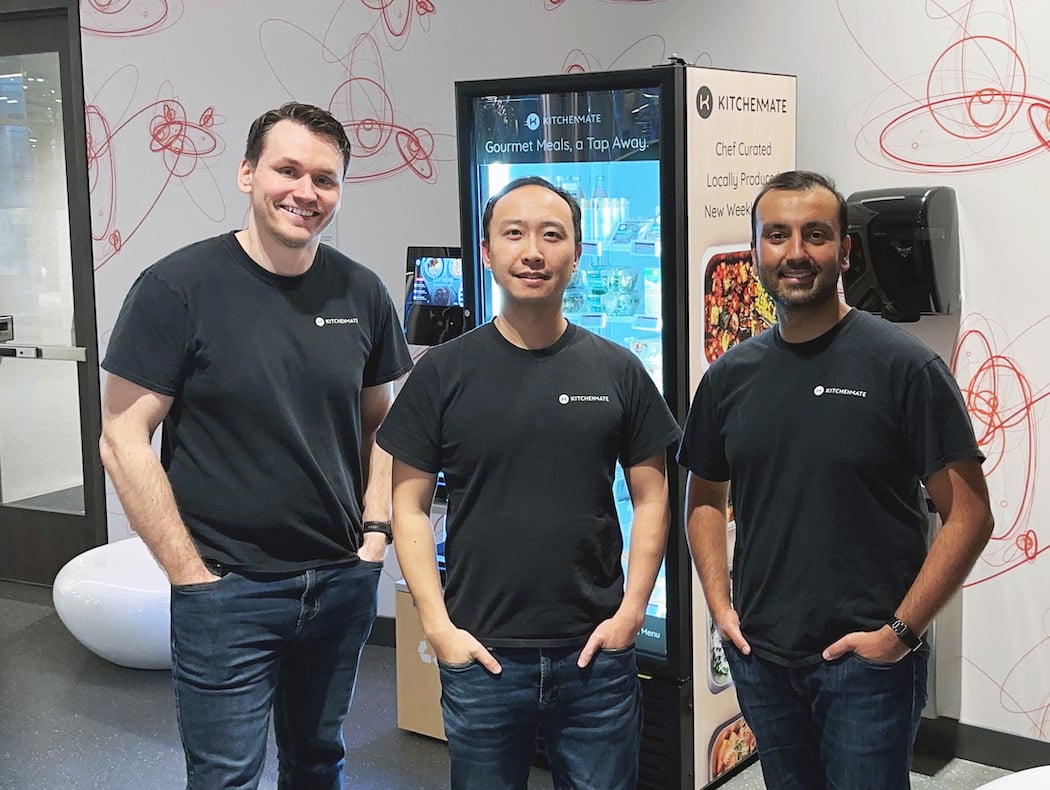When Toronto-based KitchenMate unveiled the second iteration of its smart food kiosk in the summer of 2021, the product was primed to reach the millions of workers expected to return to the office following the COVID-19 pandemic.
The “grab-n-go” onsite food product only existed on paper and in digital renderings at that stage, but KitchenMate CEO and co-founder Yang Yu believed the futuristic food dispenser’s new high-tech features, personalized menus, and contactless experience would meet the unique demands of the post-pandemic workplace.
“As the world reopens, employees are looking for good reasons to work in the office again, and they also need to feel it’s safe to do so,” he told BetaKit at the time.
Roughly two-thirds of Canadian employers still use a hybrid or fully remote work arrangement.
While office occupancy rates have improved markedly in some cities since the pandemic began, the return to work has not been as instantaneous as some expected. So, where are the workers? For office workers, it’s still mostly at home, and for those in urban areas across Canada, home is usually a condo building, which is the newest target market for KitchenMate.
Over the last five months, KitchenMate has begun rolling out the Gen2 in Toronto’s condo sector, which Yu believes is a natural step towards the company’s mission of providing convenient, high-quality meals everywhere people live, work, and play.
The Gen2, which Yu has described as an “Amazon Go in a box,” builds on KitchenMate’s first product, which operated like a “Keurig for food.” With the Gen2, users can access the startup’s Smart Fridge with a credit card; the fridge’s sensors detect meals taken, and those meals can be quickly heated with its Smart Cooker. The offering includes personalized menus, rewards and perks, selections for dietary preferences, as well as a touchless payment experience.
In May 2022, the Gen2 launched to its first customer, and by July, was ready for its wider rollout. Today, KitchenMate is in more than 50 locations in Toronto, including hospitals, offices, manufacturing facilities, and post-secondary institutions.
But Yu observed that employees weren’t necessarily returning to the office in droves. In Toronto, KitchenMate’s primary market, office occupancy rates have only reached 43 percent of pre-pandemic levels. Canadian employees overwhelmingly support working from home, and according to a recent survey by Colliers Canada, 62 percent of Canadian employers use a hybrid working model, with four percent using a fully remote arrangement.
“It all goes back to the problem we’re trying to solve, which is bringing good food to where people live, work, and play,” Yu said. “…I think what really moved the needle for us is that we realized that the office is never going to be like it was before.”

In October, KitchenMate launched the Gen2 in its first condo building, 10 York, and has since expanded to nine more condos, with 10 more expected to come online in the coming weeks.
Early results indicate that the Gen2 isn’t just gathering dust in lobbies. For an average condo building housing 700 people, Yu said roughly one-quarter of those residents use the Gen2 at least four to five times per month, and smaller cohorts are using the product as often as three times per week.
By giving residents a fresh food option right in their lobby, the Gen2 could help condo managers address food scarcity, which continues to plague thousands of Torontonians working from home, including condo dwellers. Meal deliveries, which have become the go-to option since the onset of the pandemic, can also be expensive for residents, not to mention an administrative nuiscance for property managers.
“During COVID, it was a nightmare for condos to handle all the security around masking [versus] no masking … and condos just don’t want fresh food sitting around in the building. That creates a new regulatory health concern,” Yu said.
This is where KitchenMate’s unique supply chain comes into play. The company partners with local “ghost kitchens,” which produce hundreds of servings at a time and batch-deliver the meals to food kiosks. The startup is trying to make the ghost kitchen model, which typically prepares single-serve portions to order, more efficient and cost-effective.
“If you compare our prices to what we would expect for the exact same meal delivery apps, we’re half the price, so I think there’s real value for the consumer there,” Yu added.
Yu believes KitchenMate also has a value proposition for condo managers, as well as residents. In addition to alleviating the meal delivery management burden on lobbies and staff, the startup also offers condo managers a portion of the revenue generated from the Gen2 to help them cover overhead costs, like electrical or janitorial expenses. KitchenMate’s revenue share opportunity is unique to condo customers.
“Condos are used to paying for all kinds of suppliers, but this just pays for itself,” Yu said. “They’re adding a much-needed amenity for everybody, without paying anything. That’s the value proposition.”
For KitchenMate, the opportunity in its home city alone is sizable. There are over 2,700 condo buildings in Toronto, and Yu said the company is already looking to expand to condos in nearby cities, such as Kitchener-Waterloo.
With roughly 30 percent month-over-month revenue growth, KitchenMate is also looking to the United States, where Yu noted similar problems in the foodservice industry. KitchenMate is currently working on several partnerships that would allow food service businesses to license KitchenMate’s self-serve technology. The company will likely face more competition from the burgeoning “micro market” sector in the US, but Yu believes KitchenMate’s ability to provide fresh, hot meals onsite makes it an outlier.
The startup has also not lost sight of the commercial market, and is still actively growing its commercial space customers. Yu said this market “has shrunk a little bit” for KitchenMate due to the lasting effects of the pandemic, but the company’s value proposition to this customer set remains strong.
“I think that’s how we ended up growing as well,” Yu said. “Instead of just focusing on just residential or commercial, we have a use case for both, all the while keeping the operation very similar.”
Image source Unsplash. Photo by Vladyslava Andriyenko.

